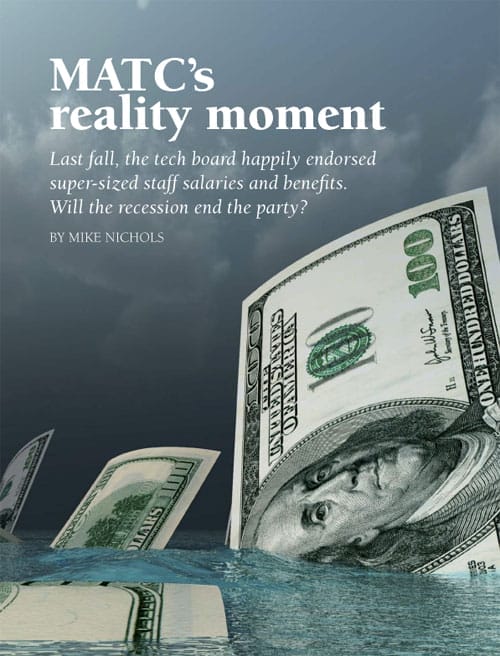
Casually convening in their boardroom late on the afternoon of Thursday, Sept. 18, 2008, the Milwaukee Area Technical College board appeared blissfully unconcerned with all that was amiss in the outside world.
Earlier that week, Lehman Brothers had stunned Wall Street by declaring the biggest bankruptcy in U.S. history; then the federal government had bailed out insurance behemoth AIG and engineered a fire sale of Merrill Lynch. The stock market was gyrating wildly.
MATC budget officials had known since spring that the economy was deteriorating. Now, it was imploding. Credit markets were seizing up. Pension funds were plummeting.
Many Americans were both flummoxed and fearful—but not the MATC board as it gathered at 4:30 p.m. for one of the most important meetings in years. And one that would last less than four minutes.
Board chair Lauren Baker sat at the head of the table. Darnell Cole, the MATC president who had repeatedly butted heads with the powerful employee unions, sat stoically to her left. She quickly took roll and announced the sole topic: new, two-year labor contracts.
There was an enormous amount at stake that afternoon. MATC has a budget of well over $300 million and employs more than 2,000 people. Salaries, wages and fringe benefits constitute by far the biggest chunk of the school’s spending—and were already eye-poppingly generous.
Consider salaries: In the fiscal year that ended June 30, 2008, the average full-time teacher at MATC had total earnings of $98,204, according to an analysis performed by the college at the request of Wisconsin Interest. That is tens of thousands of dollars more than most full-time faculty members could earn at other technical or two-year colleges in Wisconsin.
Support staff earned an average of $54,041, while full-time managers and administrators were earning an average of $94,681—far less than the teachers they supervise. The reason? MATC teachers can add $40,000, $50,000—even $60,000—to their base salaries by working more than “full-time” hours.
In fiscal year 2008, 249 of 580 full-time MATC faculty members made more than $100,000, according to college salary data. Twenty-nine made more than $130,000, and one earned $153,174.
MATC employees also have an impressive pension plan. The school pays the entire pension contribution, and most MATC employees have to work only 600 hours a year to qualify. Faculty members, like other teachers in Wisconsin, have it even better. They need only work 440 hours per year to qualify. And they also get a nice additional perk: MATC faculty can retire with an unreduced pension at age 55 if they’ve taught for 10 years.
The Cole administration did negotiate some health insurance cost-saving measures in recent years, including co-pays, higher deductibles and some premium-sharing. Still, MATC employees—who only have to work 20 hours a week or carry a 50% teaching load to qualify—enjoy a Cadillac plan.
Members of Local 212, which includes teachers and professional staff, pay just $55 to $65 per month for family coverage in the two main plans.(One plan has a $500 annual deductible, the other no deductible at all.)
For many retired employees, the district also pays half-cost of a Medicare supplemental policy right up until death—an unusual perk that is immensely expensive, almost completely unfunded and ever-growing. MATC budget documents indicate that tab is approaching $300 million.
In short, the MATC board had good reason to think twice about those labor contracts. And no urgent reason to act that day at all. The existing contracts didn’t expire for another nine months, until June 2009, and there was a long list of cost issues that deserved closer scrutiny.
Just one example: By longstanding agreement, “full-time” teachers at the college are given 15 days of sick leave per year that can be used for everything from “required attendance at a court proceeding,” to closing on a home, to responding to a tax summons, to attending a child’s graduation. Unused sick days, up to 48 of them, can be cashed in after retirement and used to pay for health insurance.
MATC Board Members:
 Lauren Baker chair (general member) program coordinator, Milwaukee Public Schools |  Robert Davis vice chair (general member) president, Zoological Society of Milwaukee |  Fred Royal Jr. secretary (employee member) employment specialist, Milwaukee HIRE |
 Peter Earle treasurer (employer member) attorney |  Bobbie Webber (employee member) president, Milwaukee Fire Fighters Association |  Ann Wilson (employer member) manager, Hillside Family Resource Center |
 Melanie Holmes (general member) vice president, Manpower Inc. |  Thomas Michalski (elected offi cial member) Oak Creek alder mechanic, Rockwell Automation |  Richard Monroe (school administrator member) superintendent, Nicolet Union High School District |
Still, the agenda that afternoon indicated that the college hadn’t just reached a new deal early. It hadn’t really reached a new deal at all. Despite the increasing economic turmoil, board members simply agreed to extend the existing 2006-2009 agreements to June 30, 2011, including two years of pay increases.
After Baker finished taking the roll, the school’s general counsel, Janice Falkenberg, remarked on just one thing: salaries. Local 587—the AFSCME union that includes public safety, clerical and food workers—was being given 3.5% annual increases for two years. Local 715—the broadcast union representing public television workers—was getting 3.25% annually. So were nonrepresented employees.
Local 212 members—full-time and part-time teachers, counselors, outreach specialists, school nurses and the professional staff in three different bargaining units—were being given 3.25% annual raises for two years.
It took Falkenberg 50 seconds give her synopsis. Baker then wound all the contracts into one resolution. Board member Fred Royal Jr.—an employment specialist at the Hire Center who has also been a union leader at the shuttered Delphi automotive plant—immediately made a motion to approve. MATC board member Ann Wilson, one of two board members who had called in over a speaker phone, offered a second and—still less than three minutes into the meeting—Baker asked if there was any discussion on the motion.
The response? Complete silence. Not a single question or comment.
Others have plenty to say.
State auditors report that both salaries and fringe benefits at MATC—which rose 85% at the school between 2001 and 2009—have traditionally been far higher than at other technical schools.
And according to MATC itself, fringe benefits by the summer of 2008 had already risen to $30,827 per employee. That means total annual salary and benefit costs for an average full-time faculty member were already averaging $129,000 per year.
Since state aid and grants have essentially remained frozen, property taxpayers have been forced to directly foot much of that personnel bill.
The board has raised MATC’s property tax levy 57% since 2001, and tax rates were already far higher than in most other districts. Indeed they were 66% higher than in the neighboring Waukesha County Technical Institute district. That translated to hundreds of dollars in extra taxes for many MATC taxpayers—enough, in the weeks prior to that September board meeting, to prompt some residents to try to secede.
None of that was mentioned. After quickly glancing at the other four board members present, and getting no response to her question, Baker didn’t bother asking individual members for a “Yes” or “No” on the new contracts. She just called for a collective voice vote. It wasn’t, after all, like much dissent was likely.
Jeannette Bell, the former Democratic state legislator and ex-MATC board member, was the sole dissenting vote when the board approved the three-year 2006-2009 contracts back in 2007. She felt they were too generous and that she hadn’t been given enough information.
“The union,” Bell told Wisconsin Interest, “has never really taken it on the chin for much of anything.”
Asked why, she said, “because of the people who are appointed [to the MATC board]. If you really want to know, look at the appointment process and who makes the appointments.”
In addition to Baker and Royal Jr., there were three other board members present at that meeting last September: Melanie Holmes, a vice president at Manpower; Thomas Michalski, a Rockwell machine repair mechanic who has also served as his plant’s chief union steward and bargaining team member; and Peter Earle, an attorney.
In addition to Wilson, one other member had called in and was listening over a phone line: Bobbie Webber, president of the Milwaukee Firefighters Association. The only other member of the board at the time, Robert Davis, president of the Zoological Society, had not shown up.
How they got there is unusual. Complicated, too.
The MATC board is appointed by a committee of 21 representatives of local school districts who, based on state law, must select two “employers,” two “employees,” a school district administrator and an elected official.
There are also vague geographic requirements and—in a twist that is unique—at least three of the nine MATC board members must be minorities. At least three must be female and at least three male.
The race and gender requirements are strictly adhered to, according to Greg Grambow. A Franklin resident, Grambow is both the president of Du-Well Grinding and a former chief operating officer for a managed dental care plan—in other words, somebody with insight into several of the board’s biggest challenges.
He applied for a board position earlier this year because he saw an opportunity to both “help shape Milwaukee’s youth” and understand employer needs.
For all his interest in serving, he says he was told the Appointment Committee couldn’t even consider him.
Sitting in his office inside his small plant on Milwaukee’s Greenfield Avenue, Grambow said Falkenberg told him he didn’t even need to show up at a hearing of the committee in March because of “the mix of people applying” for the board and the fact he did not fit the criteria—a comment he took as a reference to race and gender requirements.
“I read this as a businessperson,” he said, motioning toward a binder that laid out the appointment process, “and I think this is guaranteed failure.”
A member of the Tool, Die & Machining Association of Wisconsin, Grambow says he has had four or five colleagues approach him and say, “Are you kidding? Did this really happen?”
Yes, he says. But, he adds, they are mad about bigger issues as well. “Everybody is pretty pissed because we have lots of people paying lots of taxes and trying hard to work with MATC,” said Grambow. “I think they are pissed about the broad issue that [MATC] is not delivering anything for what has been put in.”
“Nobody from MATC is coming out and saying, ‘How can we help you? What can we do?’ Their focus is not on manufacturing.”
Falkenberg challenges Grambow’s recollection. She says she never told him he shouldn’t go to the appointment meeting, only that because of the scarcity of female candidates “his opportunity…to be considered would be minimal.”
And “it was a gender issue only,” she says. “It had nothing to do with race.”
Grambow wasn’t the only one passed over that day. So was Mary Isbister—president
and owner of General MetalWorks Corp. in Mequon. She also applied for a board “employer” position.
Curiously, the two employer seats on the board are occupied by non-businesspeople, including Earle, a sole practitioner who specializes in civil rights and employment law. His recent cases include a suit widely viewed as anti-business—an unsuccessful attempt to sue paint manufacturers for lead-poisoning damages.
The other employer spot on the board is held by Wilson, who was up for reappointment when Grambow and Isbister unsuccessfully sought a seat. Wilson manages the city of Milwaukee’s Family Resource Center at the Hillside public housing complex and would not seem, by any conventional definition, to be an employer. Still, the appointment board gave her another term.
Tim Sheehy, president of the Metropolitan Milwaukee Association of Commerce (he also serves on the board that publishes this magazine) says MATC might as well hang up a sign that says: “Business leaders need not apply.”
The community has “no employer, let alone a manufacturer, on that board,” he said. “It’s a joke, and it’s a recipe for missing the boat.”
Wilson displays limited patience for such issues.
“You have employers on the board,” she said. “I don’t know what they want.”
“The people on the board do it for free,” she said. “They are committed and work hard…. I take vacation time to do that stuff and for anybody, Tim Sheehy and the rest of them, who think it should be another way, shame on them.”
Sheehy was blunt about why he thinks the process excludes business leaders. “I think it is purely an issue of the MATC teachers union,” he said. The union is fearful “that somebody outside their sphere of control will get on that board,” he said.
“I am not picking on them,” said Sheehy. “It’s what unions do, protect their wages and benefits.” But he’d like to see a tightening of who qualifies as an “employer.”
Others would go further. They want the current system abolished altogether. Two former board members, Elliott Moeser and Joe Rice—respectively, a Glendale alderman and a Milwaukee County supervisor—are among those pushing for an elected board.
“When you are separated from the voters, I don’t think you act the same way as when you have to face the people,” said Moeser.
Rice said the current board members are recruited by “vested interests,” who he defines as “current employees and certainly representatives of organized labor groups.”
Michael Rosen, president of Local 212, responds that his union plays “no role in the selection process,” except to answer questions from board candidates and to later educate them after they are appointed.
Charlie Dee, the union’s executive vice president, charges that it is Sheehy who “wants somebody on the board he can personally control,” and argues the businesses do have influence through the many advisory committees at the college.
“The board certainly has not been a pushover, not in the 22 years I have been here,” Rosen insisted. He points out that the union and the board went through a year-and-a-half battle on the 2006-2009 contract, which wasn’t approved until 2007.
In truth, Cole seemed more willing to take on the union than the board did. (See the sidebar on page 35.) When the time came to start thinking about the next contract, it’s clear the board shied away from another fight. Royal says the board initiated the idea of the 2009-2011 contract extension on the premise that it “would bring some unity” between labor and the Cole administration.
“Any organization works best when there is unity,” said Royal.
Other board members, in the meantime, defend everything from the contracts to the finances and job placement success of the college.
And Baker, for her part, suggests the board has been financially responsible.
She points out that the college’s spending per full-time-equivalent student is about average for the state. She also notes that MATC has a strong bond rating, healthy financial reserves and balanced budgets—points she made before it was learned in early May that MATC faced a budget deficit of $19 million for fiscal year 2010.
That gap has been closed thanks largely to a union concession. In exchange for giving up one year of salary and wage increases in the 2009-2011 contract, the unions received a board guarantee that there would be no layoffs for two years.
At a meeting in late May, before voting on the preliminary 2010 budget of $357 million, board members repeatedly congratulated everybody, including one another, on addressing that deficit. Earle was particularly effusive, praising “the wonderful job that has been accomplished here” and using the word “phenomenal” to describe the budget fix.
A closer look at the budget is not so reassuring.
If that preliminary fiscal year 2010 budget is adopted, the total tax burden on district residents would remain about the same as this year. Because property values are shrinking, however, the tax rate will grow. The owner of a home that remains assessed at $100,000 would pay $384 in fiscal year 2010, $16 more than this year and an increase of more than 4%.
The labor contracts—with the exception of the one-year salary give-back—are still basically intact, and the college is about to be hit with a significant increase in required contributions to a weakened state pension fund.
Salary increases, in the meantime, will kick in again in mid-2010 when full-time teachers could, on average and by teaching additional courses, easily be earning more than $100,000 per year.
And downright worrisome: Health care costs are expected to increase another 10% in the coming year and, under the preliminary budget, the board will set aside almost nothing to offset that huge, unfunded nearly $300 million liability for retiree health benefits.
Board members, for all that, express no regret about that meeting last September. Earle says he doesn’t think “anybody could have reasonably predicted” what has happened with the economy. Rosen, for his part, says nobody back then was predicting the biggest economic collapse since the Great Depression.
As for board chair Baker, she denies that the board has acted cavalierly, saying members had discussed the terms of the contract in closed sessions.
A look back at the meeting allows observers to decide for themselves how much due diligence the board displayed.
The voice vote that afternoon passed unanimously without a word from board members other than a collective “Aye.” After the vote, Earle finally spoke up.
“Is that the first time we have had no dissenting votes on a labor contract?” he asked.
There was a little bit of laughter and everyone seemed amused—with the exception of Cole, who would be fired five months later after being cited for driving under the influence.
“We’ll send our historical research team on that one, [and have them] report back,” Baker quipped.“I have another question: Is this the first time you have had a three-minute board meeting?” asked Holmes.
“Well, I did say I want this in my batting average,” replied Baker. “I want this factored in.”
“Well,” replied Holmes, “your average is coming way down.”
“Yeah, yeah,” said Baker, “I want this factored in.”
Wilson, on the speaker phone, moved adjournment and—exactly three minutes and 34 seconds after the meeting had been called to order—it was over.




